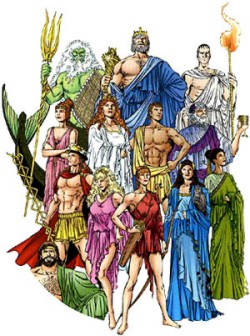 Henotheism (Greek "one god") is a term coined by Max Müller, to mean devotion to a single primary god while accepting the existence or possible existence of other deities. Müller stated that henotheism means "monotheism in principle and polytheism in fact". He made the term a center of his criticism of Western theological and religious exceptionalism (relative to Eastern religions), focusing on a cultural dogma which held "monotheism" to be both fundamentally well-defined and inherently superior to differing conceptions of God.
Henotheism (Greek "one god") is a term coined by Max Müller, to mean devotion to a single primary god while accepting the existence or possible existence of other deities. Müller stated that henotheism means "monotheism in principle and polytheism in fact". He made the term a center of his criticism of Western theological and religious exceptionalism (relative to Eastern religions), focusing on a cultural dogma which held "monotheism" to be both fundamentally well-defined and inherently superior to differing conceptions of God.Variations on the term have been inclusive monotheism and monarchical polytheism, designed to differentiate differing forms of the phenomenon. Related terms are monolatrism and kathenotheism, which are typically understood as sub-types of henotheism. The latter term is an extension of "henotheism", from (kath' hena theon) —"one god at a time". Henotheism is similar but less exclusive than monolatry because a monolator worships only one god, while the henotheist may worship any within the pantheon, depending on circumstances. In some belief systems, the choice of the supreme deity within a henotheistic framework may be determined by cultural, geographical, historical or political reasons.
Excerpted and adapted from: Henotheism